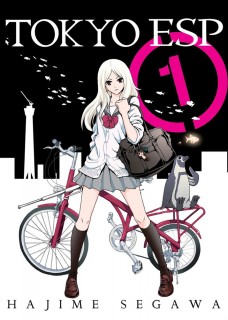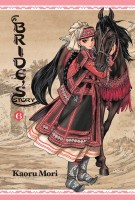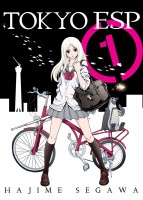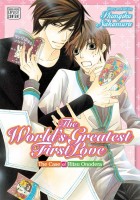 And the winner of the Tokyo ESP manga giveaway is… AshLynx!
And the winner of the Tokyo ESP manga giveaway is… AshLynx!
As the winner, AshLynx will be receiving the first omnibus in Hajime Segawa’s manga series Tokyo ESP as published in English by Vertical Comics. Tokyo ESP is a relatively recent example of a manga that’s about psychics and espers. The subgenre doesn’t seem to be quite as common as it once was in translation, but it’s certainly still around. And so for this giveaway, I asked that participants tell me a little about their favorite espers and psychics from manga. Mob from Mob Psycho 100 was mentioned the most frequently (I really hope an English-language publisher will license that series soon!), but there are other really great characters mentioned in the giveaway comments, too!
Some of the psychic/esper manga available in English:
A, A’ by Moto Hagio
Akira by Otomo Katsuhiro
Alive: The Final Evolution written by Tadashi Kawashima, illustrated by Adachitoka
Baoh by Hirohiko Araki
Betrayal Knows My Name by Hotaru Odagiri
Beyond the Blindfold by Sakura Tsukuba
A Certain Magical Index written by Kazuma Kamachi, illustrated by Chuya Kogino
A Certain Scientific Accelerator written by Kazuma Kamachi, illustrated by Yamaji Arata
A Certain Scientific Railgun written by Kazuma Kamachi, illustrated by Motoi Fuyukawa
Clover by CLAMP
Descendants of Darkness by Yoko Matsushita
Drug & Drop by CLAMP
Domu by Otomo Katushiro
ES: Eternal Sabbath by Fuyumi Soryo
From the New World written by Yusuke Kishi, illustrated by Toru Oikawa
Ghost Hunt by Shiho Inada
Hands Off! by Kasane Katsumoto
I.O.N. by Arina Tanemura
Jihai by Toshimi Nigoshi
Kimagure Orange Road by Izumi Matsumoto
Kurosagi Corpse Delivery Service written by Eiji Otsuka, illustrated by Housui Yamazaki
Legal Drug by CLAMP
Lucifer and the Biscuit Hammer by Satoshi Mizukami
Mai, the Psychic Girl written by Kazuya Kudo, illustrated by Ryoichi Ikegami
Maoh: Juvenile Remix by Megumi Osuga
Mistress Fortune by Arina Tanemura
The Melancholy of Haruhi Suzumiya written by Nagaru Tanigawa, illustrated by Gaku Tsugano
Night Head Genesis by You Higuri
Please Save My Earth by Saki Hiwatari
Psychic Power Nanaki by Ryo Saenagi
Psycho Busters written by Tadashi Agi, illustrated by Akinari Nao
Psyren by Toshiaki Iwashiro
Rasetsu by Chika Shiomi
Spiritual Police by Youka Nitta
Telepathic Wanderers written by Yasutaka Tsutsui, illustrated by Sayaka Yamazaki
To Terra… by Keiko Takemiya
Tokyo ESP by Hajime Segawa
Tokyo Babylon by CLAMP
Wild Com. by Yumi Tamura
X by CLAMP
Yurara by Chika Shiomi
YuYu Hakusho by Yoshihiro Togashi
That’s quite a list, and I’m certain that’s not all of the manga with psychics and espers to have been released in English. Even so, I think there’s a nice variety of genres and even types of psychics represented, and you’ve got to start somewhere. Thank you to everyone who participated and shared your favorite espers with me. I hope to see you again for the next giveaway!



